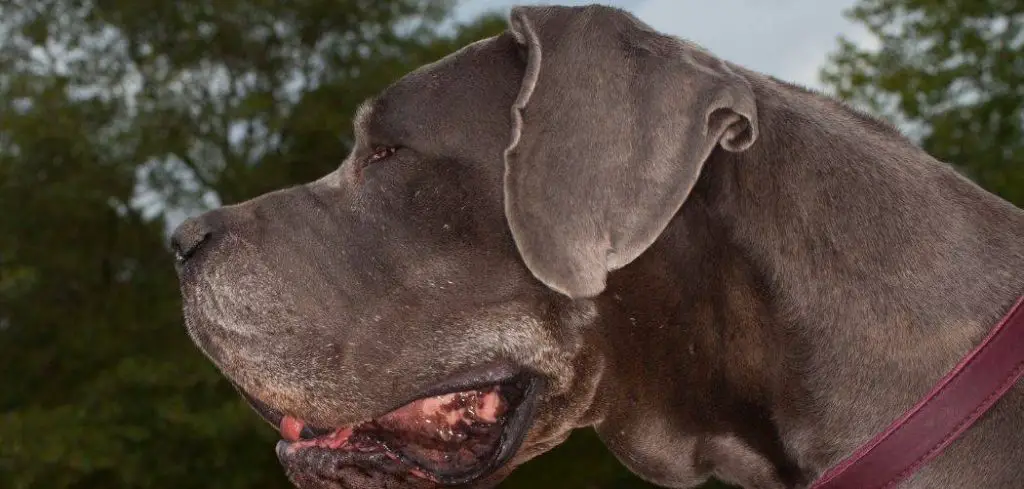If your old dog is always panting, it can be worrying, especially if it happens at rest or during the night.
While panting is a normal way for dogs to cool themselves, persistent or excessive panting in senior dogs often signals an underlying health problem.
We outline the common causes of constant panting in old dogs, what you can do at home, and when to seek veterinary help.
Old Dog Always Panting — Why It Happens
When an old dog is always panting, it may be linked to age-related health issues, stress, or difficulty regulating body temperature. Heart disease, respiratory conditions, arthritis pain, Cushing’s disease, and even anxiety can all contribute to frequent panting in senior dogs.
Sometimes panting may also be a side effect of medication or obesity, making the body work harder to function.
Because older dogs are more vulnerable to overheating and complications, frequent panting should never be ignored.

Old Dog Always Panting: Common Causes
Heart Disease
Heart problems are a leading cause of panting in senior dogs.
When the heart struggles to pump blood effectively, the body compensates by increasing breathing rate, which can appear as constant panting. Owners may also notice coughing, exercise intolerance, or swelling in the abdomen.
Heart disease in older dogs is serious, as it can progress quickly and affect quality of life. If your dog is always panting and showing these signs, a veterinary exam is crucial.
Read more: Old Dog Breathing Heavy and Not Eating (Here’s why)
Respiratory Conditions
Lung or airway problems can make an old dog pant more than usual.
Chronic bronchitis, pneumonia, or collapsing trachea are common in aging dogs. These conditions reduce oxygen intake, forcing the dog to breathe harder and faster. Panting may sound raspy, wheezy, or labored.
Because oxygen is essential for every organ, respiratory distress in senior dogs is an emergency and requires prompt veterinary care.
Cushing’s Disease
Cushing’s disease, caused by excess cortisol production, is another major reason for an old dog always panting.
Cortisol affects metabolism, organ function, and energy regulation. Dogs with Cushing’s often show panting along with increased appetite, thirst, urination, and a rounded abdomen.
Since Cushing’s is progressive, early diagnosis and treatment can help manage symptoms and improve comfort.
Pain and Arthritis
Older dogs often live with chronic pain, especially from arthritis or joint disease.
Panting can be a subtle sign of discomfort, particularly when it happens at night or after activity. Dogs may also pace, struggle to get comfortable, or avoid climbing stairs.
Pain management is essential for senior dogs, and panting due to discomfort should not be dismissed as normal aging.
Anxiety and Cognitive Decline
Not all panting is physical—sometimes it’s emotional.
Old dogs experiencing anxiety, separation distress, or canine cognitive dysfunction (dog dementia) may pant excessively, especially at night. Confusion, restlessness, and whining may occur alongside the panting.
Though not life-threatening, this type of panting can significantly affect quality of life and may be eased with behavioral support or medication.
Medication or Obesity
Certain medications, like steroids, commonly cause panting in dogs. While not harmful on their own, they may worsen if combined with other health issues.
Obesity also contributes to panting, since extra weight makes it harder for the body to regulate temperature and maintain stamina. In senior dogs, this can complicate existing conditions like arthritis or heart disease.
What to Do If Your Old Dog Is Always Panting
If your senior dog is panting more than usual, start by observing when it happens. Panting after walks or heat exposure may be normal, but panting at rest or during sleep is more concerning.
At home, ensure your dog stays in a cool, well-ventilated environment. Provide fresh water at all times and avoid overexertion, especially in hot or humid weather. Weight management also plays a huge role—feeding a balanced senior diet can ease strain on the body.
Comfort measures matter, too. Orthopedic beds, gentle exercise, and supplements approved by your vet can reduce pain-related panting. If anxiety is a factor, maintaining a calm routine and offering enrichment can help soothe your dog.
When to Call or Visit Your Vet
Panting that is constant, sudden, or paired with other symptoms should be taken seriously.
Call your vet immediately if your old dog always pants and also shows signs such as coughing, difficulty breathing, blue or pale gums, sudden weakness, or collapse. These can indicate heart failure or respiratory emergencies.
If panting is accompanied by increased thirst, urination, appetite, or a pot-bellied appearance, conditions like Cushing’s disease may be at play.
Even if the panting seems mild, a checkup is wise for senior dogs. Early intervention can make a major difference in treatment outcomes and comfort.
Read more: Old Dog Panting Excessively at Night (What it could mean)
Key Takeaway
An old dog always panting should never be dismissed as “just old age.”
From heart disease and lung problems to pain, Cushing’s disease, or anxiety, there are many reasons why panting becomes frequent in senior dogs. Some are manageable with lifestyle adjustments, while others require medical treatment.
The most important step is to monitor changes closely and consult your vet. With the right support, many older dogs can breathe easier and enjoy their golden years more comfortably.
